It was the Studio 54 of the Prairies, a venue that owner John Reid vowed would be a safe place for ‘gay people and their friends.’
Flashback is the story of a defiant disco dance culture of sweat and sex and drugs and fashion.
Located in a conservative northern Canadian city often hostile to queer people, Flashback became a sensation on the international club circuit despite police raids, threats of violence and the scourge of AIDS.
Flashback is a ghost. But it comes alive again in the memories of the people who were there and the legends they left behind.
the film
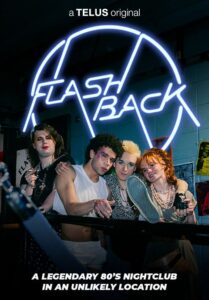 More than 30 interviews tell the Flashback story in a compelling and inclusive way, in tribute to a place where young people could just be themselves.
More than 30 interviews tell the Flashback story in a compelling and inclusive way, in tribute to a place where young people could just be themselves.
A soundtrack with two new disco recordings, 3D graphics, and archival photographs and footage takes us back inside the famous venue and blends with re-enactments shot with today’s club kids in Edmonton’s last remaining gay bar.
All this is framed by the rediscovery, restoration and resurrection of the club’s iconic neon sign. The blue glow of the old Flashback sign now shines from a wall of the Neon Sign Museum in Edmonton, and its journey to restored glory is documented in the film.
Flashback (2024) is a TELUS original feature documentary film shot in Edmonton, Alberta.
Follow the film @flashbackdocumentary on Instagram and Facebook.
Check out the 12” single of the film’s soundtrack, reproduction Flashback signs and other merchandise for sale on the production’s website flashbackdocumentary.ca. The original music is available to stream on most major platforms at Flashback Soundtrack.
the music
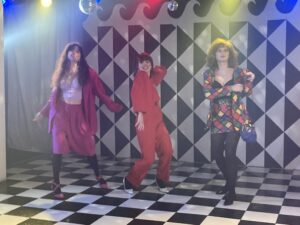
The rise of disco music in the mid-1970s led to a revolution in gay culture, and this music was central to the success of Flashback.
The club itself was located in an old warehouse built by a lumber company, with wooden floors and ceilings that provided perfect acoustics for the throbbing tracks dropped by the club’s DJs.
We recorded new music for the film at the National Music Centre in Calgary, Alberta, and we include a scene at the recording studio where we deconstruct the essential elements of a disco song.
The opening track is a cover of ‘So Many Men/So Little Time’, originally a hit song for Canadian singer Miquel Brown. The second track is ‘Don’t Stop Dancing’, an original song by Ian Dillon, Carson Dillon and Peter Hays. Both tracks feature lead vocals by D’orjay, a member of the queer community and a resident of Edmonton.
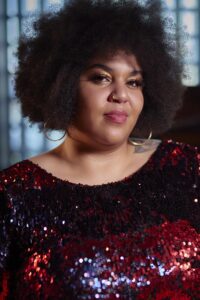
We chose ‘So Many Men’ because it was an anthem of the clubs in the early days when lonely young men first walked into a room with a wealth of potential partners.
Then AIDS devastated the community in the mid-80s, the song took on unanticipated dark overtones – not so many men any longer, and so little time came to mean an entirely different thing. Our film discusses both of these story points.
The 80s also saw the advent of the music video – a confluence of music and fashion in popular culture. Our re-enactors show how fashion trends connected to music stars of the day.
location and casting
Flashback closed in 1991. To recreate the energy of Flashback, we cast 50 kids from today’s club scene in Edmonton.
We brought on board hair, makeup and wardrobe keys who all went to Flashback when they were young. We chose cast who would represent particular pop-culture archetypes of the 80s – from George Michael to David Bowie to Cher and Madonna. We did their hair, dressed them in vintage clothing and painted their faces with sparkly makeup.
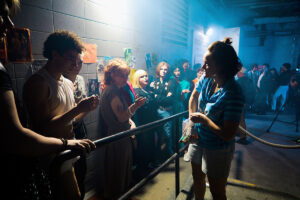 Rob Browatzke, owner of the last gay bar in Edmonton, allowed us to dress up his club Evolution Wonderlounge to resemble Flashback.
Rob Browatzke, owner of the last gay bar in Edmonton, allowed us to dress up his club Evolution Wonderlounge to resemble Flashback.
We put in a checkered dance floor, painted flats and brought in vintage stage lights and mirror balls. We added old money, stubby beer bottles, poppers and lots and lots of cigarettes.
Flashback is a TELUS original feature documentary film shot in Edmonton in 2023. A 12” single of the film’s soundtrack has been pressed. The film has an active social media presence @flashbackdocumentary on Insta and Facebook. Its website is flashbackdocumentary.ca.
POST PRODUCTION
To make a film about a place that has disappeared requires a deep dive into the places where archival film and photos have survived. Where period resources weren’t available we used 3D motion graphics to recreate the original club spaces.
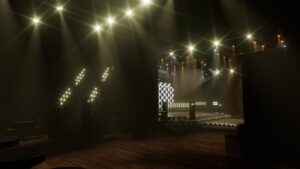 No one dared to bring a camera into a bar in Alberta in the 1980s. Three professional photographers rented studio space in the same building as Flashback, and none of them thought to walk through the club and shoot off a roll of film. Contrast that to today, where everyone has a camera in their pocket and isn’t shy about using it.
No one dared to bring a camera into a bar in Alberta in the 1980s. Three professional photographers rented studio space in the same building as Flashback, and none of them thought to walk through the club and shoot off a roll of film. Contrast that to today, where everyone has a camera in their pocket and isn’t shy about using it.
Fortunately for us, our consulting producer Patrick Monaghan decided to start filming drag shows at Flashback in 1981. This started a tradition of filming events at the club that has resulted in a trove of footage for the film.
Each of the key interviewees contributed historic photos of themselves, which helps the audience connect to them as young people who were once at the heart of the club scene.
We used blueprints and images of the club to re-create the interior space. Our 3D graphic artist Justin Thomson built clips of the building that shows us all what Flashback looked like back in the day.
THE FILMMAKERS
Brothers Matthew and Peter Hays spent many happy hours dancing at Flashback.
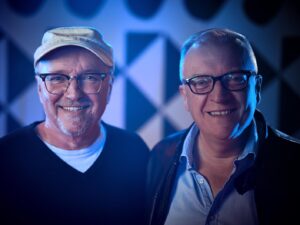 Since leaving Edmonton Peter has enjoyed a successful career as a print reporter, then a TV news producer, and then an independent television and film producer mostly working for other companies.
Since leaving Edmonton Peter has enjoyed a successful career as a print reporter, then a TV news producer, and then an independent television and film producer mostly working for other companies.
When COVID hit Peter reconsidered his career path and decided to make films about subjects he cares about.
In particular, Peter who was subjected to bullying as a youth, decided to make films about people who have overcome discrimination for his own company, Tangerine Productions Ltd.
While still in Edmonton Matthew came out publicly and began writing stories about the gay and lesbian community in Alberta.
Matt went on to become a noted journalist and author in the 2SLGBTQ+ media, and now teaches journalism and film studies at Concordia University in Montreal.
It’s a dream come true for the Hays brothers to make a film together, about a dance club that made both of them feel celebrated for who they are.

